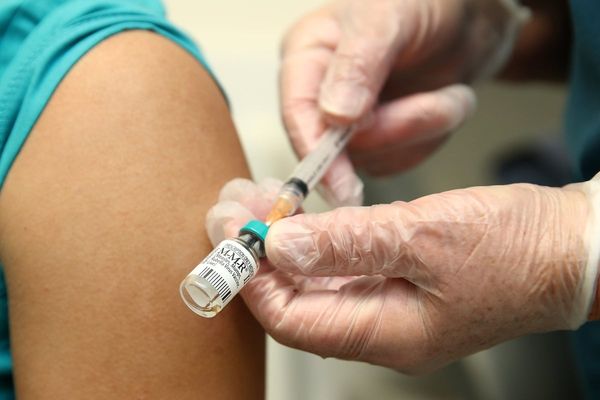Shares of United Therapeutics catapulted Tuesday, pulling shares of rivals Insmed and Liquidia higher, on positive test results for its lung disease treatment.
The company tested a nebulized form of its drug, Tyvaso, in patients with idiopathic pulmonary fibrosis, or IPF. IPF is a chronic lung disease that affects the air sacs in the lungs. The air sacs become thick and stiff, causing permanent scarring that makes it difficult to breathe.
United Therapeutics' Tyvaso outperformed a placebo over the course of a year, improving forced vital capacity by 95.6 milliliters. Forced vital capacity is a key measurement of lung function. It examines how much air a person can forcefully exhale.
Tyvaso also showed promise on secondary goals of the study, including the length of time before patients' disease worsened, a questionnaire examining quality of life, and how well patients' lungs could diffuse carbon monoxide.
United Therapeutics shares launched 32.8%, closing at 404.81. That pushed Insmed 6.8% higher to 145.30. Liquidia stock rose 3.3% to 28.58.
Benefits Across Patient Groups
Notably, patients showed improvements across all subgroups regardless of what, if any, additional background IPF treatments were being used. United Therapeutics enrolled smokers and nonsmokers, and some patients using supplemental oxygen.
The results compare favorably with Boehringer Ingelheim's Ofev and Roche's Esbriet in their pivotal studies, Leerink Partners analyst Roanna Ruiz said in a report.
"However, what fundamentally differentiates (United's study called) TETON-2 is that these benefits were achieved on top of background antifibrotic therapy, whereas the original Ofev and Esbriet registrational studies were largely monotherapy vs placebo," she said. "This suggests Tyvaso could function as an unprecedented add-on therapy with additive effects, positioning it uniquely in the IPF treatment landscape."
3 Million Patients Worldwide
Wedbush analyst Yun Zhong estimates there are roughly 3 million patients worldwide with IPF. He noted most drugs tested in patients with IPF have failed.
"The challenges in IPF clinical development includes disease heterogeneity, with variable disease course caused by multiple genetic determinants and molecule pathways contributing to lung fibrosis, and background antifibrotic therapy that further confounds patient reaction to therapy," he said.
RBC Capital Markets analyst Leonid Timashev says the results could bolster Insmed, which is testing another drug in IPF patients.
But he expects Insmed's treprostinil palmitil inhalation powder, or TPIP, to outperform United Therapeutics' Tyvaso. The drugs are similar. Tyvaso is a form of treprostinil. But TPIP uses an additional carbon chain that allows the drug to be inert when it's inhaled. This means it releases slowly in the body, lengthening its impact.
"This morning's TETON data from UTHR suggests the treprostinil mechanism is likely to drive meaningful benefits in IPF, and with INSM potentially having a best-in-class treprostinil, we see good rationale for the co exploring IPF to unlock additional opportunities for TPIP," he said in a note.
Follow Allison Gatlin on X/Twitter at @AGatlin_IBD.







